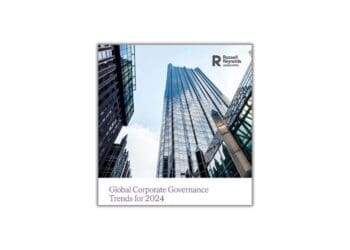How critical is sustainability performance, and how is ESG reporting likely to evolve in the coming decade? Protiviti’s Jim DeLoach explores the myriad ways strong ESG performance is vital to organizations.
As if it’s a double-edged sword, the pursuit of aggressive environmental, economic and social sustainability goals presents both opportunity and risk. Likewise, a minimalist approach to sustainability is also not without risk. This uncertainty and the growing interest of investors in sustainability performance warrant executive management’s and the board’s close attention.
One thing is clear: Sustainability reporting is expanding in many ways, with more companies disclosing sustainability data, more information included in mainstream public reports, more effort by standards setters to align sustainability frameworks, more interest within the C-suite in sustainability reporting, more board oversight and more interest on the part of policy makers, regulators and legislators. Of particular interest is how sustainability reporting will evolve and its impact on climate policy, economic development, supply chains and challenging social issues over the next five to 10 years.
Sustainability spawns divergent views and controversy, as it reaches beyond financial performance to frame what constitutes responsible behavior in driving continued development and growth without deteriorating the environment, depleting natural resources or creating conditions that destabilize the economy and vital social institutions. Short-term thinking in formulating policy and the long-term thinking driving sustainability development discussions are like oil and water. Short-termism on the part of senior management is a sustainability killer. Without a long-term outlook in both the private and public sectors, the sustainability discussion is over before it begins.
Key Realities About Sustainability
- Sustainability performance without acceptable financial performance is untenable. The two must be integrated, and neither is a substitute for the other. Overreach in pursuing either pre-empts progress. Some constituencies believe that investments on the environmental, social and governance fronts are incompatible with positive near-term returns.
- Sustainability reporting is here to stay, and it is only a matter of time before there will be uniform global standards. Many directors and senior executives believe sustainability topics are evolving into strategic issues that inevitably must be addressed by their companies. It’s just a question of when to begin.
- Reasonable men and women can differ in their views as to the appropriate sustainability objectives for a given organization, based on its industry, stakeholder interest and long-term outlook, as well as the time frame in which the entity should pursue those objectives (the so-called time horizon disconnect). The current divergence of sustainability reporting standards across the globe is certainly unhelpful in this regard.
- The time horizon disconnect drives a wedge in the dialogue, as sustainability proponents demand immediate action and an aggressive approach to implementing that action. Meanwhile, business leaders have to deal with the reality of financial and resource constraints. With strategy in the age of sustainable development and socially responsible investing challenging perceptions of the role of the corporation in society, the questions around sustainability and how hard to drive it require serious reflection for executive management and the board.
- A meaningful impact in achieving many sustainability objectives is only possible through collective efforts across multiple entities in the private sector, sound policies in the public sector, cross-border global cooperation and investors committed to the sustainability agenda. In today’s optics, it is difficult to envision such alignment.
Investing Based on ESG Factors
The concept of selective investing – environmental, social and governance (ESG) – offers a set of standards for a company’s operations that socially conscious investors use to evaluate investment alternatives. The criteria related to environmental issues examine how a company performs as a steward of the natural environment in which it operates. Social criteria pertain to how a company manages relationships with its employees, suppliers, customers and the communities where it operates. Governance deals with a company’s leadership, executive pay, control environment, assurance functions and shareholder rights. ESG is relevant because it is influencing how asset managers and long-term investors evaluate investment portfolios.[1]
According to U.S. Sustainable Responsible and Impact Investing Trends: 2018 Report,[2] more than one out of every four dollars under professional management in the United States – $12 trillion or more – was invested according to sustainable, responsible and impact investing strategies. As these professionally managed funds deploy ESG factors to screen investments, directors and executives have noticed.
Of note, Vanguard issued an open letter addressed to directors of all U.S. public companies, calling on them to improve their governance practices and outlining factors that were increasingly important in its evaluation of such practices, including ones related to diversity and climate issues.[3] BlackRock issued a letter to chief executives calling for a “positive contribution to society” beyond financial performance in realizing their organization’s full potential, with emphasis on “understand[ing] the societal impact of [their] business as well as the ways that broad, structural trends – from slow wage growth to rising automation to climate change – affect [its] potential for growth.”[4] Over time, as these demands have increased, so have requests for increased transparency.
Governance – the “G” in ESG – has steadily emerged as a significant differentiator and, increasingly, a “make or break” issue among investors. Bad corporate behavior during the Enron era at the turn of the century, reckless risk-taking precipitating the 2007-2008 financial crisis and wanton disregard of safety considerations in addressing cost and schedule pressures have accentuated the importance of effective governance and the strong organizational culture it encourages. So have events leading to serious brand erosion, such as catastrophic cyber breaches, egregious violations of laws and regulations and embarrassing supply chain exposures.
As important as these matters are, addressing them is mere table stakes. The focus on sustainability raises the bar even further, with the BlackRock letter calling for a “new model for corporate governance.”
ESG criteria have evolved into an investment methodology that embraces sustainability factors as a means of identifying companies with superior business models, offering added insight into the quality of a company’s management, culture and risk profile. But there are other reasons why ESG is vital. Younger generations place high importance on sustainability issues, so a focus on sustainability goals is essential to talent acquisition and retention. Indeed, a 2018 survey noted that 56 percent of public company directors believe that a corporate social responsibility policy increases a company’s ability to attract and retain employees.[5]
Additionally, deploying cost-effective technologies to increase process efficiencies and develop environmentally friendly products and services has become attractive in many sectors. While there is a long road to travel, the politics are brutal and there are more questions than answers, world opinion has nonetheless been uniting on the goal of achieving sustainable development.
Reporting on ESG Performance
According to Glass Lewis and Ceres, more companies – utilities and industrials, in particular – have started linking ESG performance to executive compensation. While this linkage is most often focused on goals driven by compliance with laws and regulations, there are leaders who focus on other sustainability targets.[6] For example, in the automotive industry, demanding emission standards have surfaced all over the world, as governments and regulators consider timelines that could eliminate gasoline-powered vehicles within a generation. As a result, automakers are converting their lineup to all-electric and hybrid vehicles and signaling a commitment to driving increased usage and acceptance of electric vehicles, even though current sales of such vehicles, along with plug-in hybrids, amount to a minute fraction of the current market.[7]
The point is that the world is changing as advanced technologies make feasible what was impossible a decade ago, global population growth continues to explode and evolving demographics and resource scarcity affect operations. With change comes more demanding expectations from investors seeking socially responsible behavior and increased oversight by executives and boards. As its nexus with financial performance increases, ESG performance sets a high bar for companies accountable for delivering acceptable returns to shareholders, requiring them to be more innovative, agile and strategic in their approach to integrating the two, leading to breakthroughs in process design and new products and services that offer global solutions and open up new markets.
As more companies report voluntarily, peers must consider whether to follow suit. The Sustainability Accounting Standards Board (SASB) provides many examples of companies reporting with its standards to illustrate the transparency and impact of such reports on risk management, long-term performance and brand image. Because the SASB standards are specifically tailored to U.S. companies and SEC filings, it is likely that they will continue to gain traction in the U.S.
But there are other frameworks also in use. Accordingly, the SASB, Global Reporting Initiative and International Integrated Reporting Council have announced a two-year project to collaborate on standardization of sustainability reporting frameworks as well as with frameworks that promote further integration between financial and nonfinancial reporting. Progress on this effort to harmonize frameworks and metrics could raise the level of investor interest.
A company’s commitment to sustainability and ESG issues might seem self-serving if it is pursued in the interests of the enterprise’s long-term survival. That said, the real objective of sustainable development is to extend the life expectancy of ecosystems, societies and economies through collaboration with other organizations – for profit and not-for-profit, in the private and public sectors and across borders on a global scale. This means sustaining natural resources, the cultures and communities that enable commercial activity and the governance structures and financial and other markets essential for corporate competition and viability. The question is, what does the organization do now, and how does it do it?[8]
Every organization needs to answer this question based on the nature of its industry, culture, markets, stakeholder priorities, regulatory environment, appetite to lead and invest, intrinsic challenges from an execution standpoint and long-term outlook.
An Approach for Management and Directors
- Articulate sustainability guiding principles and core values. Clarify directionally what the company wants to accomplish from a sustainability standpoint to drive strategy setting and internal and external communications.
- Assess current ESG performance. Identify areas where management sees the greatest opportunity for impact. Ordinarily, these are areas material to the business.
- Conduct an assessment of opportunities and risks. Considering the current ESG performance, assess the upside of taking steps to improve that performance against the risks associated with inaction.
- Assess the organization’s sustainability infrastructure. Understand and evaluate the effectiveness of the current policies, processes, organization structure, reporting, methodologies and systems supporting the pursuit of sustainability objectives.
- Formulate sustainability strategy. Based on the guiding principles and core values and the assessment of opportunities, risks and current sustainability infrastructure, define a roadmap of key initiatives for accomplishing sustainability objectives. Formulate the strategy to execute the initiatives set forth in the roadmap.
- Establish accountability for results. Set targets, assign executive sponsorship, define initiative ownership and specify the appropriate performance metrics. Integrate ESG performance monitoring with financial and operational performance monitoring and the reward system.
- Establish disclosure controls and procedures. Establish the appropriate controls and procedures to ensure reliable internal and external ESG reporting.
A strong commitment to sustainability places emphasis on action, not words, on disruptive innovation, not “business as usual” and, most important, on leadership, collaboration and transparency. Indifference to sustainability issues in business carries with it the risk of reputation damage, brand erosion, loss of talent, increased shareholder activism, business decline and, ultimately, business failure.
Likewise, everything else being equal, ESG criteria offer powerful differentiators for screening investments. Depending on the sector, they provide insight regarding opportunities for enhancing returns and the potential for increased future risk. Accordingly, they are worthy of attention in the C-suite and boardroom.
Questions for Senior Executives and Boards of Directors
Following are some suggested questions that senior executives and their boards may consider, based on the risks inherent in the entity’s operations:
- Does the organization have a clear long-term vision regarding sustainability? Is that vision responsive to investor and stakeholder expectations regarding sustainable development strategies and behavior in the industry?
- Are the board and executive management sufficiently engaged in developing the company’s long-term strategy and plan to create long-term value for shareholders? Is the board satisfied that its composition, diversity and structure reduce the risk of groupthink or missing opportunities for long-term growth or new threats to the company’s business model? Is the executive management team also satisfied?
- Does the company’s sustainability reporting provide sufficient insight into its nonfinancial activities related to ESG matters? Is it sufficiently focused on the ESG criteria being used by investors and asset managers following the industry and the company?
[1] “Environmental, Social and Governance (ESG) Criteria,” Investopedia: www.investopedia.com/terms/e/environmental-social-and-governance-esg-criteria.asp.
[2] Report on US Sustainable, Responsible and Impact Investing Trends, US SIF: www.ussif.org/trends.
[3] “Vanguard Calls for More Diverse Corporate Boards, Better Climate-Change Disclosures,” Ryan Vlastelica, MarketWatch, September 1, 2017: www.marketwatch.com/story/vanguard-calls-for-more-diverse-corporate-boards-better-climate-change-disclosures-2017-08-31.
[4] “A Sense of Purpose,” Larry Fink’s Annual Letter to CEOs, January 16, 2018, available at www.blackrock.com/corporate/investor-relations/larry-fink-ceo-letter.
[5] “The ROI of Corporate Social Responsibility,” Melanie C. Nolen, Corporate Board Member, 2018: https://boardmember.com/the-roi-of-corporate-social-responsibility/.
[6] “Why Most Companies Don’t Link ESG Performance to Executive Pay,” Jessica Lyons, Environmental Leader, January 29, 2016: www.environmentalleader.com/2016/01/why-most-companies-dont-link-esg-performance-to-executive-pay/.
[7] “Driving into 2025: The Future of Electric Vehicles,” J.P. Morgan, October 10, 2018: www.jpmorgan.com/global/research/electric-vehicles.
[8] The A to Z of Corporate Social Responsibility, Wayne Visser, Dirk Matten, Manfred Pohl and Nick Tolhurst, Wiley, 2010, page 115.



 Jim DeLoach, a founding
Jim DeLoach, a founding 





